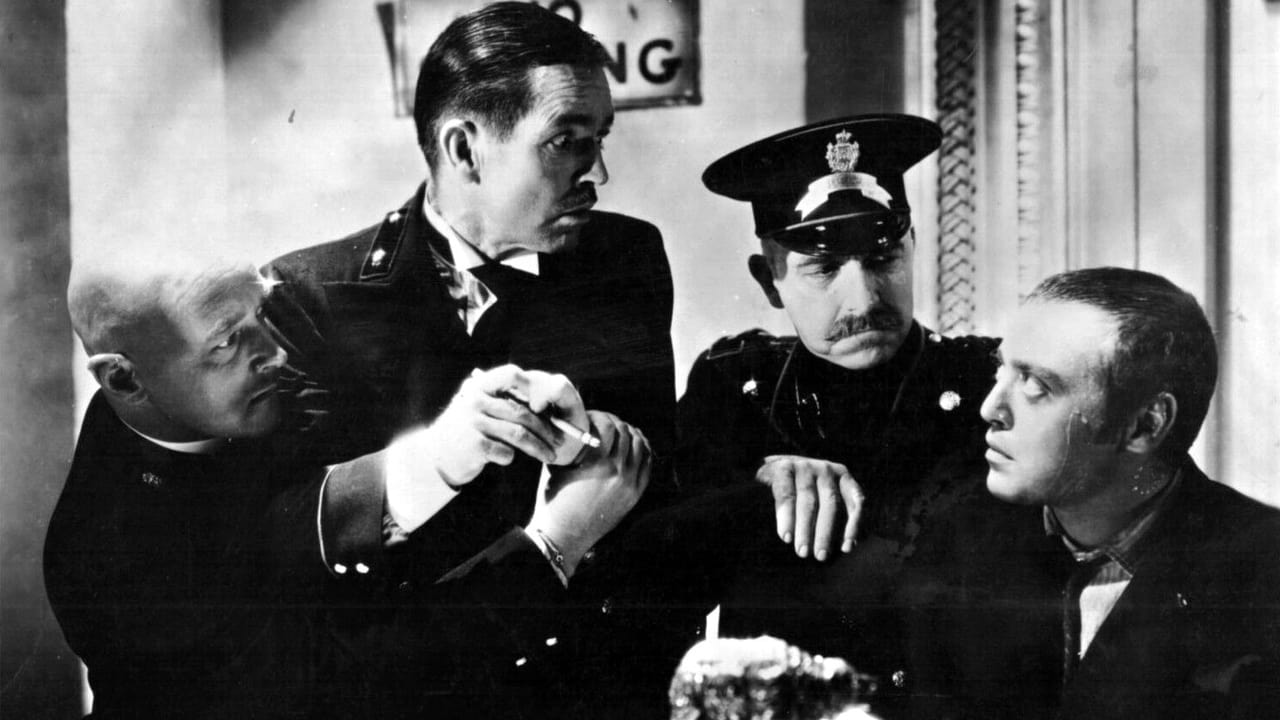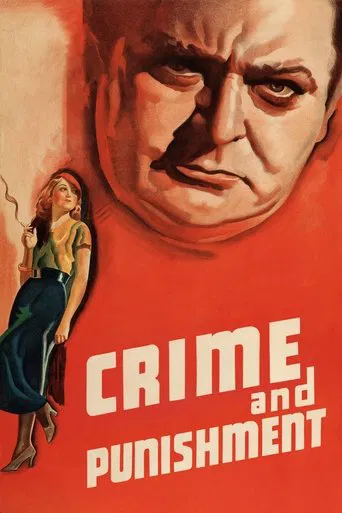

Dostoevsky's tragic protagonist Roderick Raskalnikov got a man who was born to play it cast in the lead of the film that Columbia Pictures was putting out. Peter Lorre who would soon carve out a respectable career playing all kinds of unusual characters is our lead here, fresh over from the continent where he was the lead in Fritz Lang's M and also in the cast of Alfred Hitchcock's first version of The Man Who Knew Too Much.We've heard the superior man theories all before be it from Nietzche all the way to Leopold and Loeb. There are just some folks that the ordinary rules don't apply. Usually the folks who commit those thoughts to paper see themselves as those kind of people. Can you imagine if those famous child killers Nathan Leopold and Richard Loeb had instead of killing innocent Bobby Franks had killed someone like the mean and cruel old hag pawnbroker like Lorre does here? Or some noted Chicago gangster? What would our view of them be, what would it have been back then in 1923?Lorre is a brilliant young criminology student whose work in fact has been published. Not that he's made any big money from it, in fact his landlady is ready to give him the heave ho. But in worse straights are his mother Elizabeth Risdon and sister Tala Birrell are in. They are in deep debt to Mrs. Patrick Campbell a horrible and hideous pawnbroker. When he tries to intercede for his family, Campbell says no and Lorre just loses it and bashes her head in.By the way in the novel Raskalnikov does her in with an ax and then kills another woman who walked in on the deed. With the new Code in place this was a way of gaining more sympathy for Lorre's character.The bulk of the movie is almost Columbo like. Police inspector Edward Arnold just bores in on Lorre who despite all his protestations to the contrary really does have a conscience. Still because Campbell was not liked, it's Siberia for him as opposed to noose. Arnold is one relentless upholder of the law.Back in my Crime Victims Board days when we had to determine the innocence of the victim the term public service homicide came into vogue regarding several victims whose loss was no loss to society because of their criminal activities. I think Crime And Punishment takes that view here.A good but rather softened version of Crime And Punishment is this film.
... View MoreThis rather static and flat telling of Doestevski's classic novel is a turgid affair from the get go. Peter Lorre's Raskanikov is moodily over the top throughout while Joseph Von Sternberg's direction moves his characters listlessly through hazy sets that resemble abandoned buildings. The real crime in this picture is its construction.Raskonikov graduates at the top of his class being singled out for his uncanny ability to deduce with superior insight. It does not translate into a well paying job however and he is soon off to the vile pawnbroker to keep his family above water. At the shop he encounters a streetwalker,getting her fair share of abuse from the pawnbroker and a friendship ensues. Raskonikov furious of the inequity between his decent friend and the well heeled harridan decides to off her. Confident that his superior intelligence will keep him from getting caught he goes through with it but comes up against a worthy adversary inspector Poriphy and the battle of wits begins. Raskonikov is also fighting on a second front with his conscience.Without meal ticket Marlene and big studio Paramount's production values director Josef Von Sternberg's future got a good look at it with this stilted interpretation of minimalist set decoration and haphazard lighting. With the exception of a few scenes isolating Lorre this early master of light and shadow goes from artist to house painter with drab tableaux in a fog. Lorre is all over the place and his erratic lead lurches to and fro while a becalmed inspector, effectively performed by Edward Arnold, gives him more than enough rope to seal his fate. The underrated Marian Marsh as Sonya also shines but with Lorre chewing scenery in large bites and Von Sternberg without his Paramount perks Crime and Punishment has you doing time.
... View MoreDirector Josef von Sternberg once said that the best stories come from brief sources like newspaper articles. His condensation of Dostoyevsky's cumbersome novel into an 88 minute film, bears his statement out. I've always felt that Crime and Punishment would have worked better as a short story than a novel. There's neither enough plot nor philosophical speculation to justify its length. The film is a visual treat (it's a Sternberg) and moves along at a fast enough pace to keep interest from lagging -- even when the end is inevitable from the outset (courtesy of the Production Code). But the film's greatest strength is in its actors. Edward Arnold, the too beautiful to be real Marian Marsh, and especially Peter Lorre. Mr. Lorre is riveting in his depiction of Raskolnikov's journey from poverty driven desperation, to fear, to arrogance, to his ultimate repentance and redemption. It's not only one of his finest performances, but one of the cinema's all time greats.
... View MoreFyodor Dostoeyevski is, without a doubt, one of the greatest novelists of his native Russia, of 19th Century Europe, and of world literature. That said, he is also a pain in the ass to read. If you are into his views of self-sacrifice and mysticism, and of redemption through intense, sometimes meaningless suffering, you can't find anyone else like him. If you also like anti-Western slavophilia, with more than a dollop of anti-Semitism, he's your guy. These aspects appear in his Russian contemporary Tolstoi too, but Count Leo had a more universal view of forgiveness and brotherhood than Fyodor ever had. Therefore Tolstoi makes his occasional snide comments, but they are quickly dropped - not intensively developed. With these serious reservations said, Dostoeyevski remains monumental. Most people recall him for two novels: CRIME AND PUNISHMENT and THE BROTHERS KARAMAZOV. Neither of the two novels were ever successfully made into U.S. films, despite a great director in this 1935 version of the former novel, and a grade "A" cast and production in the 1958 version of the latter that starred Yul Brynner and Maria Schell. From what I have seen a Masterpiece Theatre version of CRIME AND PUNISHMENT in the 1970s was far closer to the novel than Von Sternberg's 1935 version. But Von Sternberg, working with Columbia Pictures, did not have as good a budget (and certainly could not make a four hour film).CRIME AND PUNISHMENT has been called the first psychological detective novel, and the best. It is not a who-done-it in the spirit of Dashiell Hamnett's THE THIN MAN. It is more like a Columbo episode (and Columbo's character is obviously modeled on the laid back, wise Detective Inspector Porphiry - who patiently allows Raskolnikov to give himself away and up). Dostoeyevski lets us see the killing of the old pawn broker and her sister, and understand the twisted "philosophical altruism" that Raskolnikov uses to commit his crime. It is a murder for social purposes - get rid of the leech like money lender/pawn broker, grab her money, and use it to aid those truly unfortunate in society. Had the murder been committed quickly with only the pawn broker killed, the absurd logic might have worked. Instead, because the sister of the victim sees the killing, Raskolnikov has to kill her too for self protection. From that time forward his philosophical base begins to crash. Also he discovers that the material answer of money is not enough to help the poor or those he comes to love. As such CRIME AND PUNISHMENT is (no real slap at Conan Doyle) light-years away in effectiveness from THE HOUND OF THE BASKERVILLES. And watching the Russian police procedural in the novel, as Porphiry helps whittle away at Raskolnikov's iron core of beliefs is quite good too.Peter Lorre gives an affecting performance as the killer, one more role in a chain beginning with "M" that would continue for much of his admirable career. It must have been well received publicly. The Ritz Brothers spoofed his performance in one of their films. Arnold is fine as Porphiry, who has seen all the murder types (and can quickly find their weak spot). Here, his best moment is when another lesser suspect confesses unexpectedly just as Lorre seemed about to confess. It leaves Porphiry perplexed and troubled, as the confession has been heard by witnesses (including a smart aleck Lorre), and Porphiry realizes an innocent man has possibly put his life in danger by such an act. There are some good supporting touches too, especially seeing Mrs. Patrick Campbell in her last performance on screen as the pawnbroker, a dried up, malevolent figure that one does not waste too much pity on (again, if she had been the only victim Raskolnikov's philosophical point would have been correct). Cuts due to budget and time considerations ruined several parts - Douglas Dumbrille as a married man who wants Lorre's sister (Lorre can't stand him) and who helps bring Lorre to book (for personal reasons) had a larger part in the novel, including suicide. That is not in the film.With all it's budget restraints though, it is a good introduction to the great novel and I recommend it.
... View More